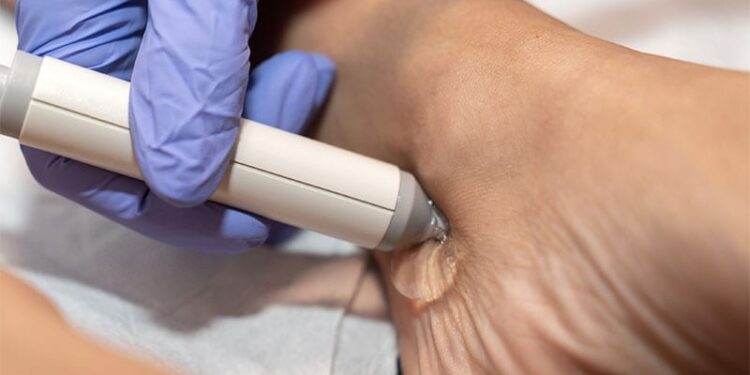TOPLINE:
Patients with type 2 diabetes (T2D) and peripheral artery disease or diabetic foot ulcers who initiated semaglutide instead of other glucose-lowering medications had a significantly reduced risk for the composite outcome of peripheral percutaneous transluminal angioplasty or critical limb ischemia and were less likely to require a lower extremity amputation.
METHODOLOGY:
- The management of peripheral artery disease in diabetes involves controlling risk factors and using standard atherosclerosis therapies, and recent trials have shown that certain GLP-1 receptor agonists reduce cardiovascular risk and improve limb perfusion and walking ability.
- Researchers conducted a single-center retrospective observational study to compare the occurrence of major limb events in patients with T2D who initiated either injective or oral semaglutide vs other glucose-lowering medications (metformin, SGLT2 inhibitors, sulfonylurea/glinides, insulin, and pioglitazone) in a real-world setting between January 2020 and April 2025.
- They included two propensity score-matched cohorts of 167 participants each, comprising patients with T2D for at least 1 year; documented peripheral artery disease or diabetic foot ulcers with an exposed tendon, joint, or bone; and data on outcomes of major limb events available.
- The primary outcome was major limb events, defined as a composite of peripheral percutaneous transluminal angioplasty or critical limb ischemia.
TAKEAWAY:
- During a mean follow-up duration of 30.1 months, the risk for major limb events was 23% lower with semaglutide than with other glucose-lowering medications (hazard ratio [HR], 0.77; P = .029).
- Compared with other medications, semaglutide was associated with a 24% lower risk for peripheral percutaneous transluminal angioplasty (HR, 0.76; P = .045) and a 50% lower risk for lower extremity amputation (HR, 0.50; P = .008).
- Only 8% of patients experienced adverse events (mainly gastrointestinal) with semaglutide, and none required treatment discontinuation.
IN PRACTICE:
“Among persons with T2DM [type 2 diabetes mellitus] and PAD [peripheral artery disease] or foot ulcers, the use of semaglutide was associated with a significantly lower risk of major limb events than other GLT [glucose-lowering therapies]. This is coherent with the cardiovascular benefits associated with the use of certain GLP-1RAs [GLP-1 receptor agonists],” the authors of the study concluded.
SOURCE:
This study was led by Paola Caruso, PhD, Division of Endocrinology and Metabolic Diseases, University Hospital Luigi Vanvitelli, Naples, Italy. It was published online on July 07, 2025, in Diabetes, Obesity and Metabolism.
LIMITATIONS:
The observational and retrospective nature of the study design are major drawbacks of this study. As a single-center study, the findings have lower external validity and generalizability compared with multicenter studies. The authors noted that residual confounding may exist due to measurement error and unmeasured factors, such as socioeconomic variables that are associated with worse prognosis of diabetes and its vascular complications.
DISCLOSURES:
This study did not receive any funding. Some authors disclosed that they received consultancy fees from and/or gave lectures for certain pharmaceutical companies.
This article was created using several editorial tools, including AI, as part of the process. Human editors reviewed this content before publication.
Source link : https://www.medscape.com/viewarticle/better-limb-protection-semaglutide-vs-common-t2d-meds-2025a1000i5u?src=rss
Author :
Publish date : 2025-07-09 08:49:00
Copyright for syndicated content belongs to the linked Source.








